 Petzlover
PetzloverBully Kutta is originated from India but Doxiepom is originated from United States. Bully Kutta may grow 62 cm / 25 inches higher than Doxiepom. Bully Kutta may weigh 78 kg / 172 pounds more than Doxiepom. Bully Kutta may live 4 years less than Doxiepom. Both Bully Kutta and Doxiepom has almost same litter size. Bully Kutta requires Low Maintenance. But Doxiepom requires Moderate Maintenance
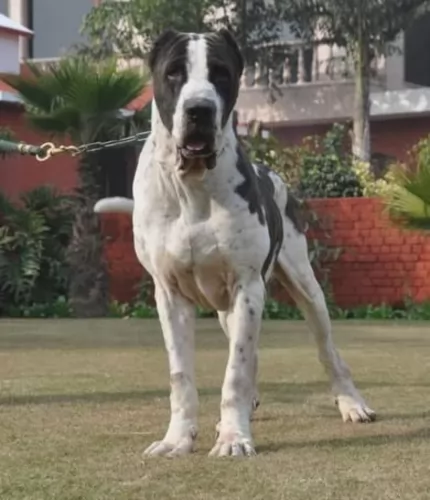 This well built, powerful dog breed is also known as Indian Alangu Mastiff or Pakistani Mastiff. These dogs come from the Punjab and Sindh region of the Indian subcontinent. It is believed that mastiff dogs came with British soldiers during the British invasion, however English Mastiffs, Bulldogs, Bull Terriers and Great Danes are seen as potential ancestors of this large dog.
This well built, powerful dog breed is also known as Indian Alangu Mastiff or Pakistani Mastiff. These dogs come from the Punjab and Sindh region of the Indian subcontinent. It is believed that mastiff dogs came with British soldiers during the British invasion, however English Mastiffs, Bulldogs, Bull Terriers and Great Danes are seen as potential ancestors of this large dog.
There are disputes about the country of origin of this breed, and some people claim that the dog comes from India, while others say it comes from Pakistan. Certainly in Pakistan these dogs are still used for fighting.
The Doxiepom is a small dog known as a designer breed which has originated from crossing the well known Dachshund dog with another well known pure-breed dog, the Pomeranian.
This has resulted in the hybrid breed – the Doxiepom.
Both these pure bred dogs have their own history each but the Doxiepom is a new dog breed. It is believed that this mix of Pomeranian and Dachshund was originally developed in the United States in the 1990’s and while he doesn’t have much of a history, you can have a look at the history of the parent dog breeds.
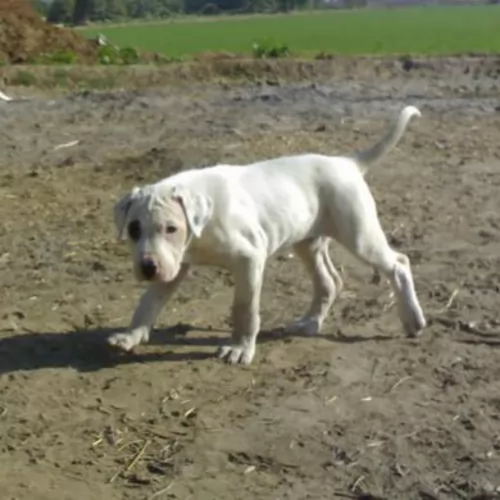 The Bully Kutta is a big, heavy, muscular dog, standing at roughly 81 – 89cm and weighing in at 70–90kg. He isn’t particularly good with children or with other pets simply because the dog is aggressive by nature. If you do opt for this large breed, you’re going to need a large garden and he is going to require a lot of exercise.
The Bully Kutta is a big, heavy, muscular dog, standing at roughly 81 – 89cm and weighing in at 70–90kg. He isn’t particularly good with children or with other pets simply because the dog is aggressive by nature. If you do opt for this large breed, you’re going to need a large garden and he is going to require a lot of exercise.
This is a dog breed that is going to require socialization and training if you want him to be obedient and calm, as he is inclined to be a dominating breed. He’s an intelligent dog and when well trained, he makes a splendid pet with firm, fair owners.
The Bully Kutta has a large, broad head which is supported by a thick well-muscled neck. The skin around his lower jaw is loose. The ears are short, set high and are mostly cropped, but other times they are left to flop over. The tail is sometimes docked but these days mostly left long and tapered.
He has a short smooth coat and is essentially white in color although the coat can also be fawn, brown, black or brindle.
The Doxiepom is a small dog - a cross between the Dachshund and the Pomeranian, and this means he can have characteristics from each of these breeds.
They’re short dogs, standing at roughly 12cm to 27cm. A full grown Pomeranian Dachshund mix can weigh between 3kg and 12kg.
With a fairly long body from the Dachshund side, he has floppy ears or they can be semi-erect and the tail is long.
You can’t really say what the dog will look like exactly and the coat may be long or short with some of the coat colors being tan, black or brown.
Their dependent nature can mean these little dogs battling with separation anxiety, and he is a dog that doesn’t like being left alone for long periods of time.
He easily attaches himself to just one member of the family while being friendly and loving to everyone else as well.
They’e fun loving, playful dogs and want to be involved in their family’s activities, whether indoors or out. They’re friendly, but are aloof with strangers. He makes a great watchdog too, barking when strangers enter the property.
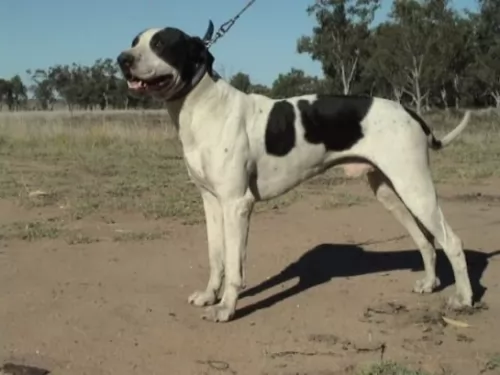 The Bully Kutta is a powerful, imposing dog and they have been nicknamed the ‘Beast from the East’. Unfortunately it is this dog’s thick bones, his looks and his strength that have him used for cruel dog fighting in Pakistan.
The Bully Kutta is a powerful, imposing dog and they have been nicknamed the ‘Beast from the East’. Unfortunately it is this dog’s thick bones, his looks and his strength that have him used for cruel dog fighting in Pakistan.
When not used for fighting, he makes a loyal, devoted companion for the owner who ensures proper socialization and training. Well raised Bully Kuttas are then good with children, being loving, protective and playful.
One just hopes that the future of this giant dog breed is brighter, and that he will be looked upon as more of a companion that just a dog-fighting object to bring in money for his owner.
One of the strong characteristics of the the Doxiepom is that he shares a strong bond with his human family.
He is such a amicable little dog, ready to join in with the children in their games as well as in the activities of the adults.
He craves human companionship, and if you provide him with a happy home, he promises to give you devoted companionship throughout his life.
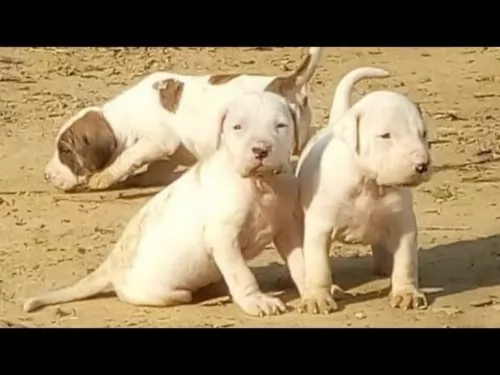 Your Bully Kutta is generally a healthy dog and not often affected by hereditary diseases, but with giant breeds such as this you will have to look out for diseases common to large dogs.
Your Bully Kutta is generally a healthy dog and not often affected by hereditary diseases, but with giant breeds such as this you will have to look out for diseases common to large dogs.
Typical illnesses to watch out for will include hip dysplasia, arthritis, skin allergies and bloat.
This is an inherited condition where the hip joint is improperly formed. For your Bully Kutta it causes wear and tear as well as stiffness in the hips and your dog battles to rise after lying down.
Arthritis in your dog can be managed but it can cause a lot of discomfort for him. This inflammation of the joints can cause pain and stiffness. It is more often seen in older dogs. It can also start at an early age because of problems with bone and joint development and abnormal rubbing within the joint.
Today there are a number of therapy options that can bring some kind of relief to your dog.
The Doxiepom is a little dog who isn’t going to cost you a lot of time at the vet, however there are some typical dog illnesses that you will do well to know about.
Generally the Doxiepom has a lifespan of about 12 to 16 years and with good care, your pet can reach this age too.
As far as health problems go, your dog could be affected, although it is unlikely, as he is a robust dog breed.
Your pet could inherit health problems more common to either of the breeds. Little dogs suffer with their own set of heath problems and these could be back problems, dental- and eye disease and allergies.
A common health problem with a small dog like this is obesity. They don’t need a lot of food but because they’re so friendly and entertaining, some owners over-feed them.
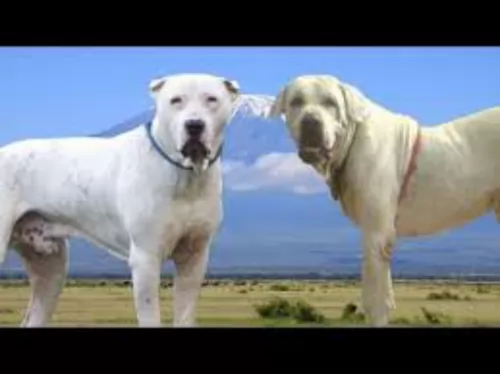 The short coat is low maintenance and as a moderate shedder too, all that is required really is to give your Bully Kutta a good brush twice a week to keep the coat in good condition.
The short coat is low maintenance and as a moderate shedder too, all that is required really is to give your Bully Kutta a good brush twice a week to keep the coat in good condition.
Brush his teeth 2 or 3 times a week with special canine-toothpaste and toothbrush to prevent plaque build-up. He’s a drooler too, so you will need to wipe his face and maybe your clothes of slobber from time to time.
This strong, muscular dog of yours will require an excellent diet. It’s always wonderful if you can give him home-made food such as vegetables, rice and meat. These days you get excellent commercially manufactured food for dogs, and your vet can advise you on the best food for a large, active dog such as the Buly Kutta.
Raw meat is absolutely essential for your dog from time to time and will ensure that his coat doesn’t become dull and with bald spots. Remember, that before dogs were domesticated they used to live on raw meat, so see that he gets some raw meat to prevent skin disorders. Make sure your large pet has a constant supply of fresh, cool water.
Bully Kuttas are going to need a walk every day in the form of exercise. If he is socialized you can take him into the park for ball games. He is a dog that will require plenty of space.
The Doxipom has moderate grooming requirements, shedding somewhat throughout the year, so brushing him twice a week will keep the coat shiny and healthy.
If your pet has turned out to have more long hair than short, he may require some professional grooming. His nails will also need clipping and his ears will also need to be checked for infection.
Small dogs often battle more with dental and gum problems, and plaque and tartar buildup results when food gets trapped between the teeth, leading to gingivitis which can lead to premature tooth loss. Keeping the teeth clean is therefore important.
Small dogs have quicker metabolisms than big dogs and they also mature faster than the larger dogs. Smaller dogs actually require more calories per kilogram than big dogs because they burn up energy faster than larger breeds.
It is therefore important to feed your small dog the right amount of food to support their growth rate and to maintain weight in adulthood. Homemade foods for your Doxiepom are always wonderful, but of course many people who work make use of some of the good commercially manufactured dog foods out of sheer convenience.
Go for the better quality brands which have top ingredients in them so as to avoid deficiencies.
Raw meat should also make up part of the diet – fish, chicken and red meat. Always make sure your pet has access to fresh, cool water.